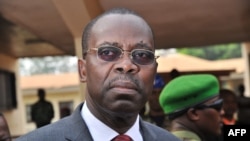The prime minister of the Central African Republic is defending his decision to temporarily ban text messaging in a bid to combat spiraling unrest.
Prime Minister Andre Nzapayeke said the C.A.R. is "at war."
In a VOA interview, Nzapayeke said citizens are being "held hostage" by Seleka and anti-Balaka militias and "manipulators who want to destabilize the nation."
"We must choose: freedom or keep people from the hands of criminals. For us, we choose protection of the people,” said Nzapayeke.
Earlier this week, the prime minister announced text messaging services had been suspended until "further notice."
The decision follows an increase in violence in the capital, Bangui, including an attack on people who had sought refuge in a church last week that left at least 11 people dead.
Authorities also say recent calls for a general strike had been relayed by text messaging services.
Nzapayeke said the C.A.R. does not have a network of security and intelligence agents. He claimed that measures such as the text messaging suspension will help authorities control security.
The C.A.R. descended into chaos last year after mostly Muslim Seleka rebels toppled President Bozize.
Attacks and looting by Seleka forces sparked retaliatory attacks by mostly Christian anti-Balaka militias.
Currently, a 6,000-troop African mission and about 2,000 French troops have been trying to restore calm in the country.
In April, the U.N. Security Council agreed to authorize a nearly 12,000-member U.N. peacekeeping force for the C.A.R. The force takes over in mid-September.
Prime Minister Andre Nzapayeke said the C.A.R. is "at war."
In a VOA interview, Nzapayeke said citizens are being "held hostage" by Seleka and anti-Balaka militias and "manipulators who want to destabilize the nation."
"We must choose: freedom or keep people from the hands of criminals. For us, we choose protection of the people,” said Nzapayeke.
Earlier this week, the prime minister announced text messaging services had been suspended until "further notice."
The decision follows an increase in violence in the capital, Bangui, including an attack on people who had sought refuge in a church last week that left at least 11 people dead.
Authorities also say recent calls for a general strike had been relayed by text messaging services.
Nzapayeke said the C.A.R. does not have a network of security and intelligence agents. He claimed that measures such as the text messaging suspension will help authorities control security.
The C.A.R. descended into chaos last year after mostly Muslim Seleka rebels toppled President Bozize.
Attacks and looting by Seleka forces sparked retaliatory attacks by mostly Christian anti-Balaka militias.
Currently, a 6,000-troop African mission and about 2,000 French troops have been trying to restore calm in the country.
In April, the U.N. Security Council agreed to authorize a nearly 12,000-member U.N. peacekeeping force for the C.A.R. The force takes over in mid-September.








